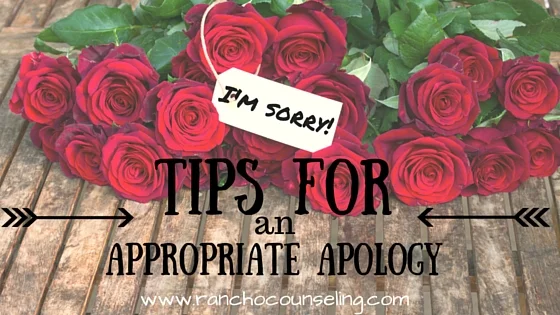
Blog
I’m Sorry! Tips for an appropriate Apology
I’m sorry. Two short, simple words – just two words! But why are they often so difficult to say?
We’ve all been there, you have a fight with your partner, and whether it’s about something big or small, when it’s all said and done you have that icky feeling in your gut, and you know that it’s time to apologize.
You swallow your pride, and take a stab at “I’m sorry,” but things go horribly wrong, and round 2 ensues. As you start your fight all over again, you think “what the hell?? I said sorry!”
Chances are, the apology was either premature, or not executed properly. Here are a few things to consider when crafting an appropriate apology:
Before you utter those two powerful words, ask yourself - What am I apologizing for?
As a therapist I can tell you, there’s nothing worse than sitting in session with a couple and hearing one partner say, “I’m sorry you felt that way.”
An apology is taking action for something you did, said, or thought, and so you can’t apologize for someone else’s feelings. When you do apologize for another’s feelings it has a negative connotation and sends the message that their feelings aren’t important.
Understanding your part in what’s taken place might take some time, and while you might not feel you did anything wrong, the bottom line is your partner had a negative reaction to what was said or done, so take some time to think about your part in the matter and go from there.
A premature apology can do more harm than good. If you’re still upset or angry, and yell out, “I’M SORRY!” you’re not likely to get the best response.
The look on your face, the positioning of your body, and the sound of your voice all have to be in line with the message you’re trying to convey.
If you’re still angry, and not truly sorry for what you’ve said, then don’t apologize. But do take some time away to collect yourself, calm down, and get in the right headspace so you can come back with all things aligned.
An appropriate apology starts with you and ends with a suggestion for ways to create a different outcome in the future.
No one likes hearing someone tell them they’re sorry for something they did, just to have them do it over again. If you’re sorry for name-calling or blaming, then own it, and come up with ways that you’ll avoid doing it in the future.
If it means taking yourself out of a certain situation, or asking for time alone when you feel yourself getting to that point, then practice asking for what you need, and doing so in a way that shows respect to both you and your partner.
Arguments in relationships are inevitable. We don’t always see eye to eye, and that’s ok because that’s what makes us individuals. But when we do something to cause our partner hurt, a great apology can go a long way, and it can be the start of great conversation that will lead to better outcomes in the future.


